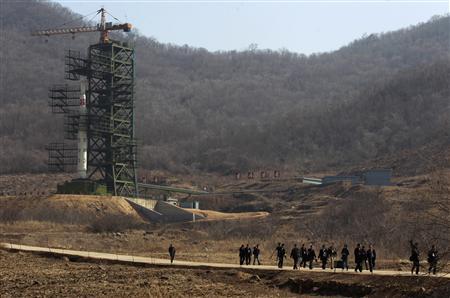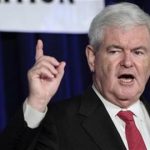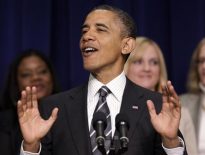(Reuters) – A joke circulating among officials in Beijing pretty much underlines the bind China is in over North Korea’s plans to send a
satellite into space.

front of the Unha-3 (Milky Way 3) rocket is pictured sitting on a launch pad at the West Sea Satellite Launch Site, during a
guided media tour by North Korean authorities in the northwest of Pyongyang April 8, 2012. REUTERS/Bobby Yip
North Korea’s young ruler Kim Jong-un phones a Chinese leader to tell him about timing of the
planned rocket launch. “When will it be?” asks the Chinese leader.
Kim replies: “Ten, nine, eight, seven, six, five,
four…”
Beijing has received more notice than that – the launch is likely later this week – but a source close to
China’s top leadership and a Western diplomat have both said it nevertheless has little influence over Pyongyang and is in
no position to block the event.
The United States, which has said the launch will give the unpredictable state an
opportunity to test ballistic missile technology, wants Beijing to use its influence to halt the lift-off.
“China has
pressured North Korea to abandon
(the launch) because it adds new variables and gives the United States an excuse to return to Asia,” the source with ties to
the leadership told Reuters, requesting anonymity to avoid repercussions.
“China does not want to see this because
Beijing and Shanghai are within range” of North Korean ballistic missiles, he said, referring to China’s political and
financial capitals and providing further evidence that Beijing does not have fully warm and friendly ties with its
unpredictable neighbor.
^^^^^^^^^^^^^^^^^^^^^^^^^^^^^^^^^^^^^^^^^^^^^^^^^^^^^^^^^
For video from N.Korea, click
^^^^^^^^^^^^^^^^^^^^^^^^^^^^^^^^^^^^^^^^^^^^^^^^^^^^^^^^^
n
Critics however are convinced China, the main provider of food and energy aid to its isolated neighbor, could do more to
force North Korea to scrap the launch.
Last month U.S. President Barack Obama urged China to use its influence over
North Korea instead of “turning a blind eye”, and warned of tighter sanctions if the reclusive state presses ahead with the
launch.
On Monday, U.S. State Department spokeswoman Victoria Nuland said there were signs that North Korea may also
be preparing for a nuclear test, its third.
“We believe in particular that China joins us in its interest in seeing a
denuclearized Korean peninsula, and we are continuing to encourage China in particular to act more effectively in that
interest” she said.
Nuland told reporters a third North Korean nuclear test “would be equally bad if not worse” than
the rocket launch.
It would be in the interests of both China and North Korea at this juncture to say Beijing has
little influence over Pyongyang.
But the countries have maintained warm relations despite tensions in recent years.
Before his death last year, North Korean leader Kim Jong-il visited China four times between May 2010 and August 2011. His
son Kim Jong-un, who is now leader of the autocratic state, is believed to have accompanied him on at least one of this
trips.
The rocket that North Korea has readied for launch from a forested valley in its remote northwest will showcase
its ability to fire a missile capable of hitting the continental United States.
Pyongyang insists the weather
satellite launch will be a milestone to mark the 100th birth anniversary of Kim Jong-un’s grandfather, North Korea’s
founder Kim Il-sung, and backing down now would be seen as sign of weakness at home. Nonetheless, Washington and Seoul
suspect it is a ballistic missile test.
“They can’t launch the thing without using ballistic missile technology which
is precluded by U.N. Security Council Resolution 1874,” said Nuland, the U.S. spokeswoman. “So regardless of what they say
about it, it’s still a violation.”
But sending rockets skyward to mark momentous events is a tradition shared by the
Communist leaders of both China and North Korea. Having launched satellites in 1982 and 1987 to mark the death anniversary of
Mao Zedong and in 1992, 1997, 2002 and 2007 to coincide with Communist Party congresses, China is finding it difficult to
convince North Korea to back down.
COMING-OUT PARTY
Pyongyang’s move, analysts say, is also aimed at further
consolidating the power of Kim Jong-un, believed to be in his late 20s, who became the third member of his family to rule
North Korea after his father’s death last December.
“If Kim No. 3 requires a symbol of his authority, that rocket
launch might be that symbol tied to the legitimacy of the (ruling) Korean Workers’ Party,” the Western diplomat
said.
That authority could be challenged if China were to pressure Pyongyang over the rocket launch at this juncture.
And Beijing does not want any instability that could arise from a weakened Kim Jong-un.
But the real issue may
China’s willingness to exercise influence rather than its ability to do so.
“The question is not if China has or
doesn’t have leverage to pressure Pyongyang. The question is whether it wants to exercise that pressure,” South Korean
political commentator Shim Jae Hoon said. “Any sign of displeasure shown by China at this time will not fail to have an
impact on Kim Jong-un.”
And in the end, China sees some value in the North Korean regime as a buffer against South Korea-U.S. military
alliance.
“The worst case scenario troubling Beijing is the prospect of a democratic, capitalist South Korea
reunifying the whole peninsula. China thinks this will bring U.S. military presence close to its border,” Shim
said.
China is caught between a rock and a hard place.
“It’s troublesome. North Korea is difficult to control.
We have no choice but to help them” by continuing to provide aid, the source with leadership ties said, adding that squeezing
Beijing’s food and energy lifeline to Pyongyang could lead to an exodus of North Korean refugees destabilizing China’s
northeast.
China’s relationship with North Korea was once characterized to be “as close as lips and teeth” after they
fought side-by-side against the United States and South Korea during the 1950-53 Korean War. But the two strayed apart after
Beijing flirted with capitalist-style reforms — seen by Pyongyang as a betrayal — and recognized Seoul in 1992.
Deng
Xiaoping, China’s late leader, once quipped that dynastic succession is not a Communist tradition, riling Kim Jong-il who
was poised to take over from his father, sources familiar with China’s foreign policy said.
China takes great pride
in transforming itself into an economic powerhouse from a backwater after just three decades of reform and is growing
increasingly impatient with what it sees as an incompetent North Korean leadership which cannot feed its own people, the
sources said.
“Our relationship with North Korea is no longer ‘If the lips are gone, the teeth will be cold’,” a
second source with leadership ties said, quoting a Chinese idiom. “Nowadays, the teeth keep biting the lips, and it’s
hurting.”
(Editing by Raju Gopalakrishnan and
Don Durfee)





